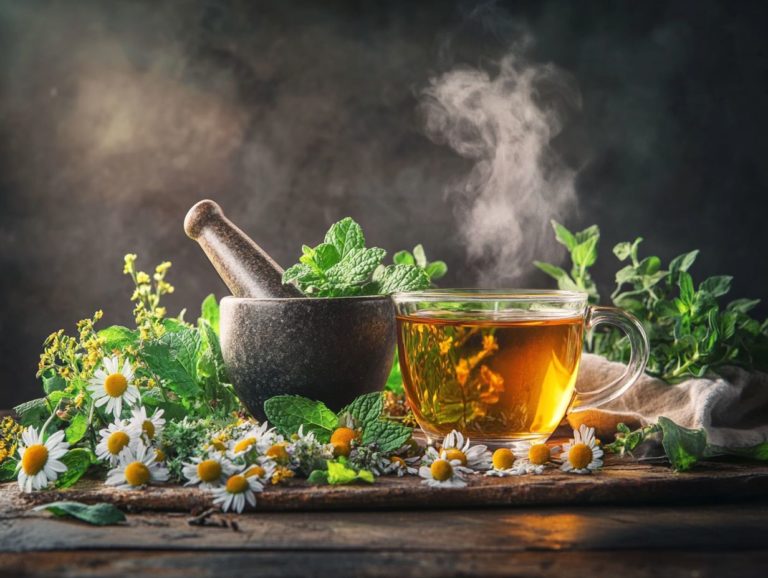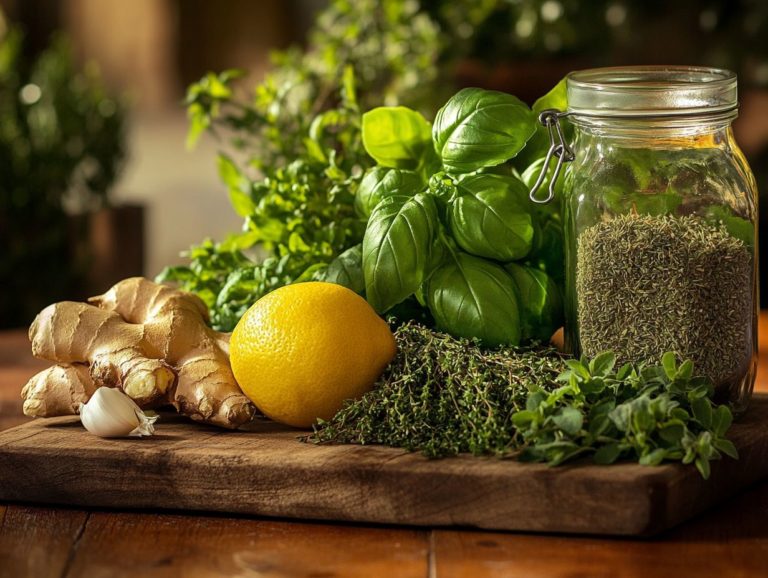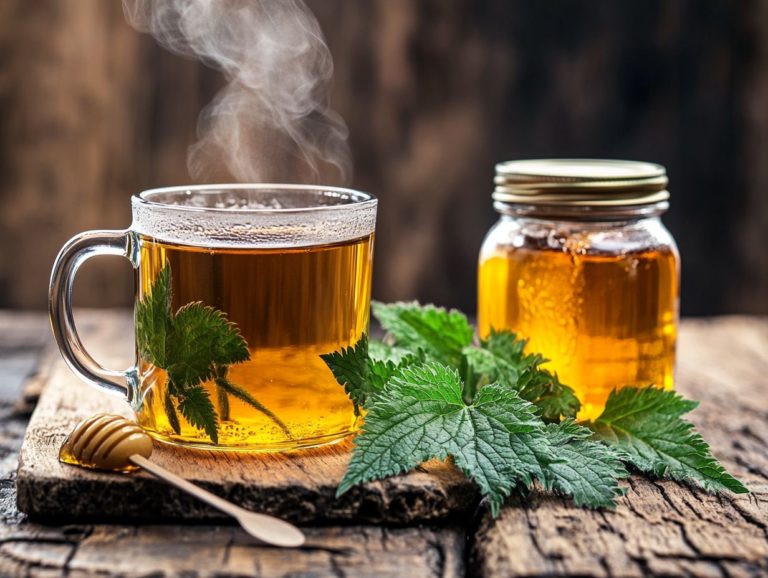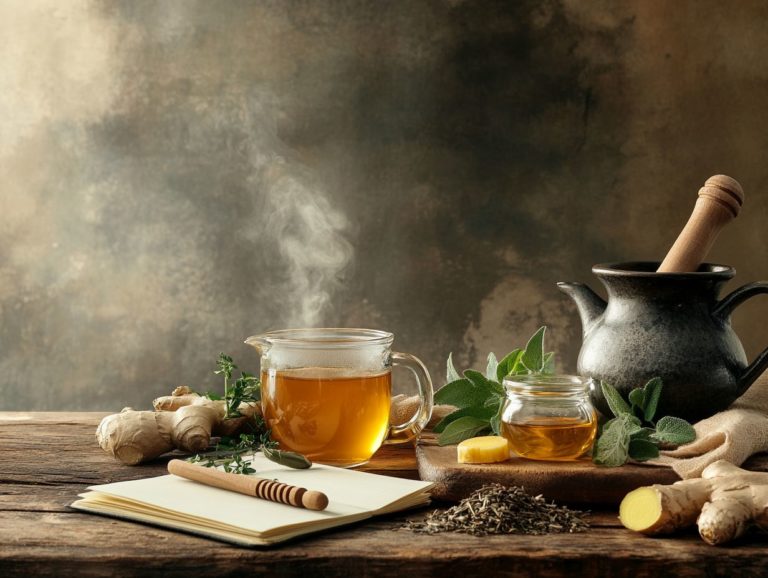5 Best Herbal Teas for Digestive Health
When nurturing your digestive health, herbal teas can serve as a soothing and effective remedy. From the calming essence of peppermint to the zesty kick of ginger, these natural brews offer a spectrum of benefits designed to ease discomfort and promote overall wellness.
In this exploration, you ll discover five herbal teas particularly beneficial for digestion, each with its own unique advantages and potential side effects. You ll also receive valuable tips on seamlessly incorporating these delightful teas into your daily routine, enhancing your journey toward better digestive health. Prepare to brew your way to a happier gut!
Contents
Key Takeaways:
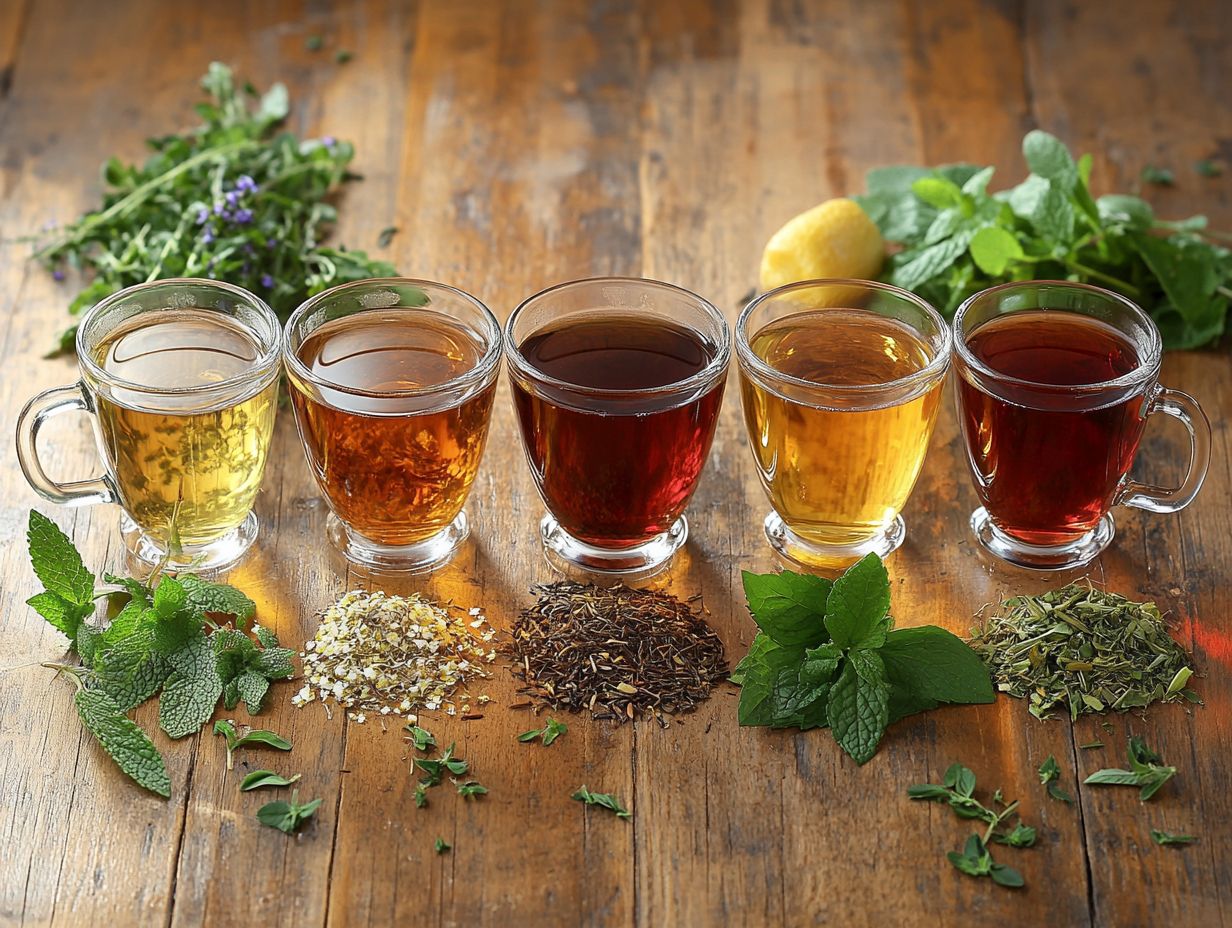
Peppermint tea can help soothe digestive issues like bloating, gas, and stomach cramps due to its anti-inflammatory and antispasmodic properties. Ginger tea is known to improve digestion, relieve nausea, and reduce inflammation in the digestive tract. Chamomile tea has calming and anti-inflammatory effects that can ease digestive discomfort and promote better sleep.
1. Peppermint Tea
Peppermint tea, derived from the Mentha piperita plant, is a gem you ll want to add to your health routine. Renowned for its great health benefits, especially in supporting digestion, it s a favorite among the health-conscious.
This caffeine-free herbal tea doesn t just soothe discomfort; it also offers a refreshing taste that enhances your overall wellness. With its rich properties, it serves as an effective digestive aid, tackling symptoms like bloating and stomach pain while providing natural support for gut health.
The art of preparing peppermint tea hails from ancient civilizations. The process is simple and rewarding: steep the leaves in hot water, allowing the essential oils to infuse into your brew. Regularly enjoying this herbal infusion can transform it into a comforting ritual, seamlessly weaving it into your daily routine.
If you re experiencing gastrointestinal disorders, this soothing drink can be a game-changer! Many individuals find that sipping warm peppermint tea after meals helps alleviate feelings of fullness and discomfort, solidifying its reputation as a reliable natural remedy for digestive support.
2. Ginger Tea
Ginger tea, crafted from the Zingiber officinale root, is celebrated for its great health benefits, particularly in enhancing digestion and alleviating various digestive discomforts.
Incorporating it into your wellness routine can be a game changer. Its rich heritage in traditional medicine stretches back centuries, with cultures throughout Asia harnessing ginger’s remarkable anti-inflammatory properties.
If you often grapple with indigestion, bloating, or nausea, a comforting cup of this tea could offer the relief you seek. Research suggests that regular consumption might alleviate symptoms associated with conditions like irritable bowel syndrome (IBS) and even mitigate postoperative nausea.
Enjoying a warm cup of ginger tea before meals can pique your appetite and soothe your stomach, becoming a favorite habit with benefits that countless others have also discovered.
3. Chamomile Tea
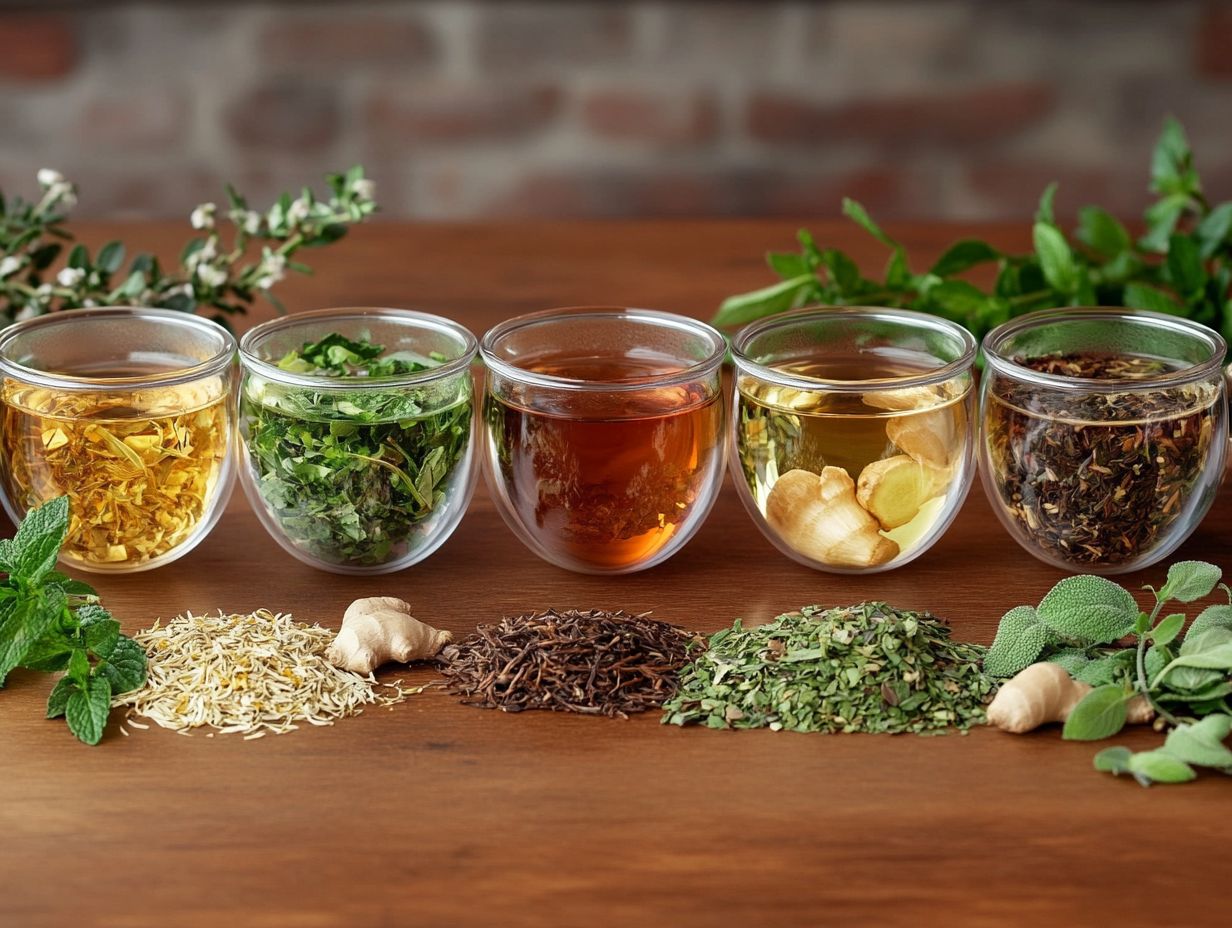
Chamomile tea, derived from the delicate flowers of the Althaea officinalis plant, offers soothing effects that promote relaxation and provide significant health benefits for your digestion.
This herbal infusion has long been celebrated for its ability to ease gastrointestinal discomfort, making it a staple in many wellness routines especially for those facing stress-related digestive challenges. By calming your nervous system, chamomile nurtures both mental tranquility and physical well-being, offering relief from bloating and indigestion.
To brew the perfect cup, steep one teaspoon of dried chamomile flowers in hot water for about five minutes. You might like to add a drizzle of honey or a splash of lemon for an extra touch of flavor. This simple ritual can become a delightful way to weave soothing self-care into your daily life.
Start brewing these herbal teas today for a happier gut!
4. Fennel Tea
Fennel tea is made from fennel seeds. It offers great benefits for digestion and helps with bloating.
People have used this herbal tea for years for its soothing properties. It can help ease gas and stimulate appetite.
To brew it, steep a teaspoon of crushed fennel seeds in hot water for about 10 minutes. Sipping this warm drink can provide comfort and relief from digestive issues.
5. Dandelion Tea
Dandelion tea is made from the leaves and roots of the dandelion plant. It s known for supporting digestive health and detoxification.
This herbal infusion is full of vitamins A, C, and K, and packed with antioxidants. Dandelion tea helps your body make bile, easing bloating and discomfort.
You can enjoy it warm in the morning or as a soothing evening drink. It s a wonderful way to enhance your digestive health.
What Are the Benefits of Herbal Teas for Digestive Health?
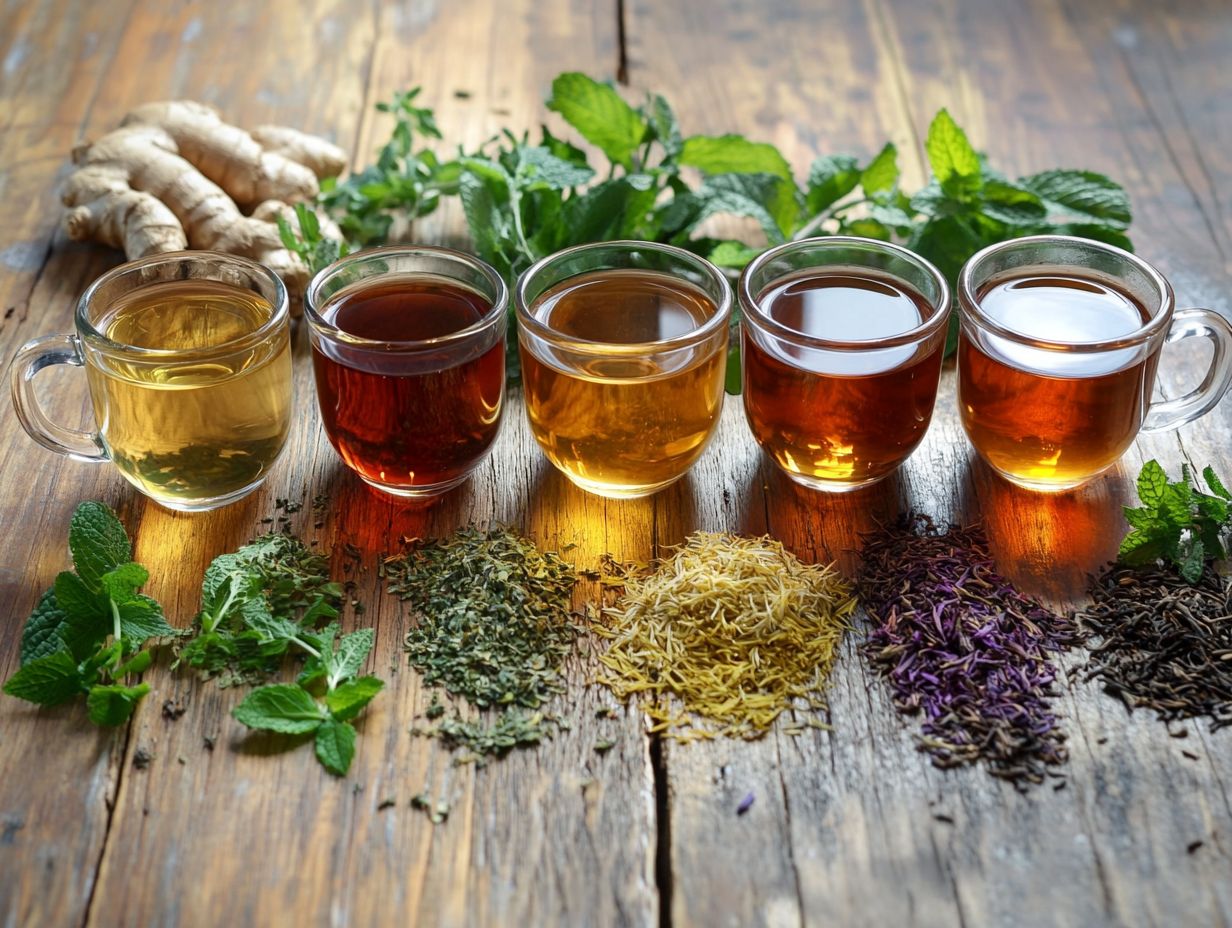
Herbal teas have been loved for centuries for their digestive health benefits, providing herbal remedies for common digestive issues and offering natural solutions for various digestive problems.
Nutrient-rich infusions like ginger, peppermint, and chamomile tea support your gut health. Each blend targets specific digestive symptoms, making them valuable for anyone focused on better digestion.
Incorporating these teas into your routine can enhance digestion and create a sense of calm. For instance, ginger tea helps with nausea, while peppermint tea relaxes your gut muscles.
Chamomile tea is known for its anti-inflammatory benefits, soothing upset stomachs and improving sleep quality. Embracing these herbal teas is a flavorful way to nurture your digestive health.
How Do These Herbal Teas Help with Digestion?
Herbal teas like peppermint, ginger, and chamomile can ease discomfort and help with various gut issues. They promote digestive health through different mechanisms.
Peppermint tea relaxes gut muscles, providing relief from bloating. Ginger tea boosts digestive enzyme production, enhancing nutrient absorption.
Chamomile tea calms the stomach lining and reduces irritation. By adding these teas to your daily routine, you can support your digestion and find relief from common digestive troubles.
What Are the Potential Side Effects of These Herbal Teas?
Herbal teas are generally safe and beneficial. However, some individuals may experience side effects, especially when drinking certain types like peppermint or ginger tea.
These adverse effects can range from mild gastrointestinal discomfort to serious allergic reactions, particularly for those with existing sensitivities. Be mindful of your health circumstances, as certain herbal teas may interact with prescribed medications, potentially altering their effectiveness or causing unwanted reactions.
For instance, chamomile tea can affect blood-thinning medications, which help prevent blood clots. This underscores the importance of consulting healthcare professionals before adding new herbal remedies to your routine.
Understanding your personal health conditions and paying attention to how your body responds is essential for safely enjoying these natural beverages.
How Can One Incorporate These Herbal Teas into Their Diet?
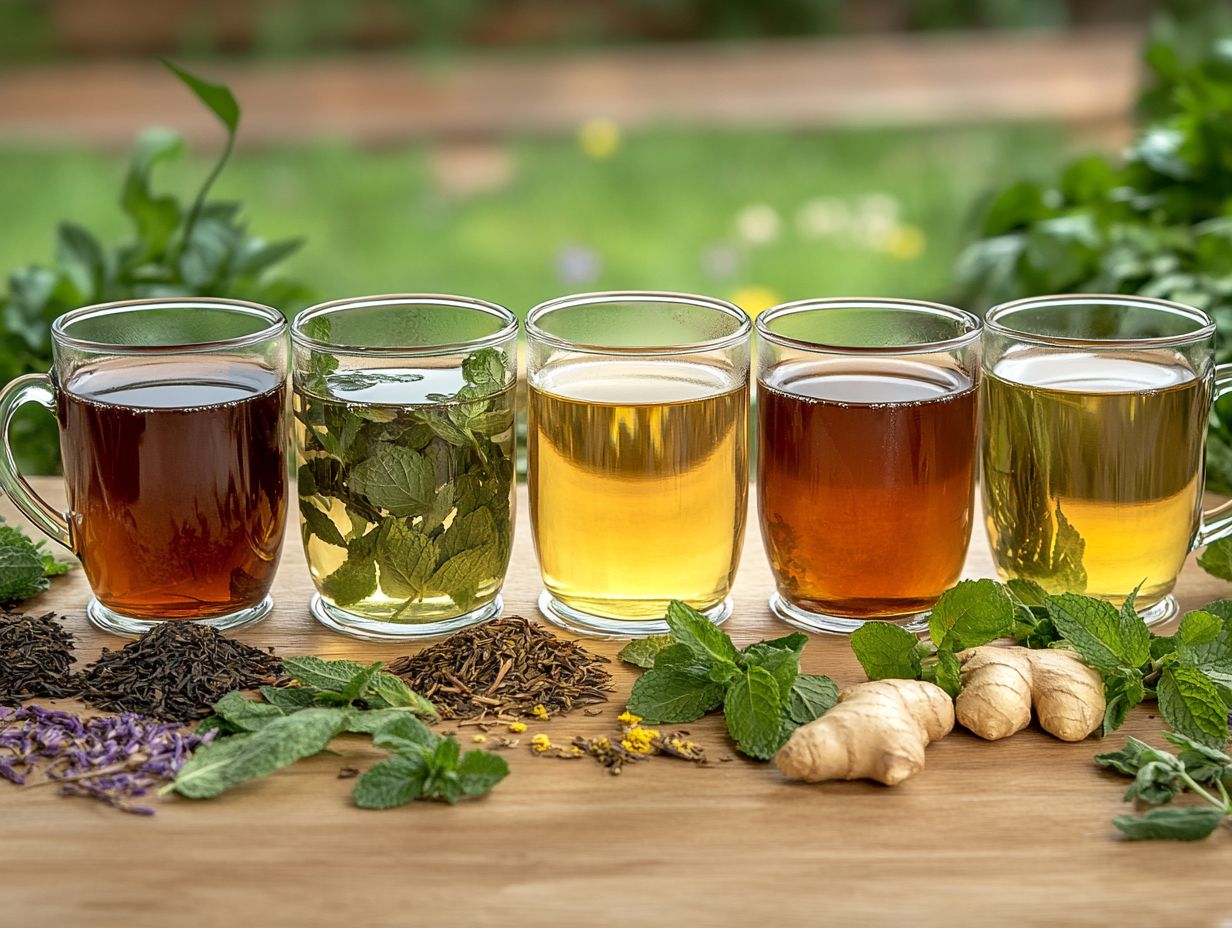
Incorporating herbal teas into your diet can elevate your daily routine, offering health-conscious options that support digestive health and overall wellness.
By choosing specific times for tea consumption, you can create a soothing ritual that complements your meals and snacks. For example, starting your day with a warm cup of ginger tea can invigorate your senses, while sipping chamomile in the evening can help you unwind and promote restful sleep.
Enhancing your snacks with herbal teas whether by adding them to smoothies or enjoying chilled infusions can enrich your meals without stealing the spotlight.
As the day unfolds, taking moments for a tea break not only offers a rejuvenating pause but also encourages hydration, leading to improved well-being and vitality.
What Are the Other Uses of These Herbal Teas?
Herbal teas do more than just aid digestion; they provide numerous health benefits that can elevate your wellness and serve as natural remedies for various conditions.
These soothing infusions can give your energy levels a gentle boost, making them an excellent choice when you need a pick-me-up without the jitters from caffeinated drinks.
Certain herbal blends are known for their calming effects, helping you unwind after a long day or promoting a restful night s sleep.
By incorporating these teas into your daily routine, you can enhance existing wellness practices, like mindfulness or yoga, while also addressing common issues such as headaches or stress.
The versatility of herbal teas makes them a valuable ally in your pursuit of a holistic approach to health.
Are There Any Precautions to Take When Consuming These Herbal Teas?
While herbal teas offer various benefits, it s crucial to take precautions for safe consumption, especially if you have underlying health conditions.
Be aware of potential allergies from specific herbs and any interactions with standard medications that could lead to adverse effects.
Moderation is key; overindulging in certain herbal blends might not only diminish their benefits but could also trigger unwanted symptoms.
If you have health concerns or are pregnant or nursing, consult a healthcare professional before incorporating herbal teas into your routine. This ensures a safe and enjoyable experience tailored to your needs.
Don’t miss out on the benefits of these herbal teas! Experiment with different varieties and find the ones that suit your taste and wellness goals. Explore recipes or guides to enhance your herbal tea experience.

